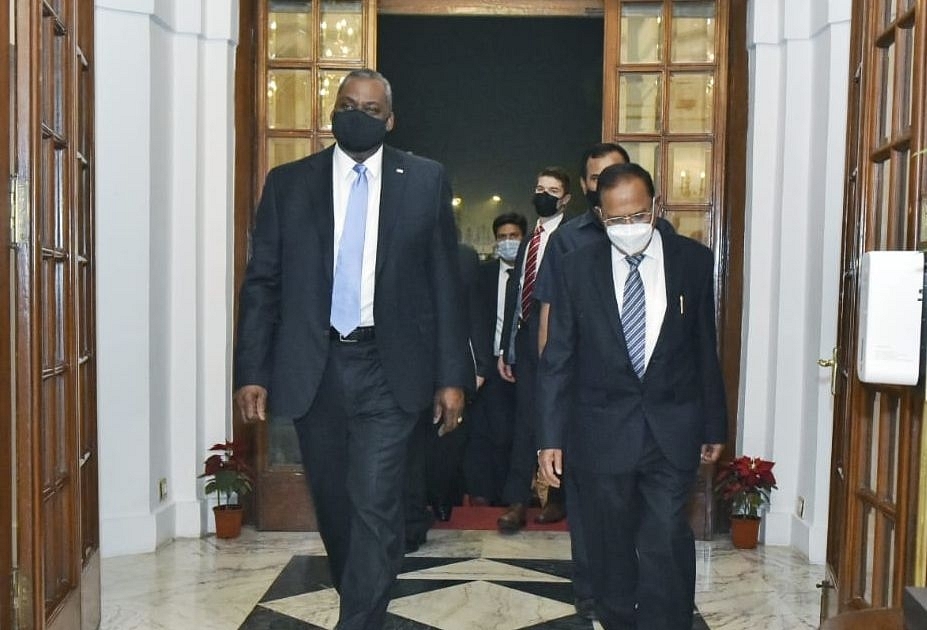News Brief
US Defense Secretary Lloyd Austin In India: These Four Issues Are On The Agenda For Talks
- US Defense Secretary Austin will hold talks with Defence Minister Rajnath Singh and Foreign Minister S Jaishankar today.

US Secretary of Defense Lloyd Austin and National Security Advisor Ajit Doval.
The United States Secretary of Defense, General (Retd) Lloyd Austin, arrived in New Delhi on Friday, his third stop on his first overseas tour. The first senior official of the Biden administration to visit India, Austin called on Prime Minister Narendra Modi and held talks with National Security Advisor Ajit Doval.
In India till 21 March, Austin will meet his counterpart, Defence Minister Rajnath Singh, on Saturday, and also hold talks with Foreign Minister S Jaishankar.
Here are four issues that will be on the agenda during these talks:
1) Defence Deals
India and the US are likely to discuss possible defence deals, including the purchase of 30 armed drones by the Indian Army, Navy and Air Force. The three services have come to an agreement to jointly procure 30 MQ-9 Reaper or Predator B drones.
The MQ-9s, which have an endurance of around 30 hours, will help the Indian military monitor Chinese activities along the Line of Actual Control and keep an eye on its activities in the Indian Ocean. The 30 drones, likely to cost India around $3 billion, will be divided among the three services, with each getting 10.
During the standoff with China in Ladakh, two MQ-9B SeaGuardian surveillance drones had arrived at the Arakkonam naval air station in Tamil Nadu on lease from General Atomics under emergency procurement rules.
The purchase of six more P-8 submarine-hunting aircraft could also come up for discussion. India has already inducted at least nine P-8I aircraft and a deal for four more was signed in 2016. India has also kick-started the process for acquiring six more of these aircraft with a “letter of request” to the US.
P-8s not only help India keep track of Chinese activities in the Indian Ocean but also on land, along the LAC, where the aircraft have been deployed during the standoffs in Doklam and the ongoing tensions in eastern Ladakh.
2) China
While US Secretary of State Antony Blinken holds talks with China in Alaska, Defense Secretary Austin will discuss China with India.
India is likely to brief the US Defense Secretary on the tensions with China in eastern Ladakh, the People’s Liberation Army’s aggressive behaviour along the LAC, including the aggression in the Galwan Valley, and the ongoing disengagement process.
The two sides will discuss the developments in the Indo-Pacific and cooperation under Quad, which also involves Japan and Australia. Last week, US President Joe Biden, Australia's Prime Minister Scott Morrison, Japan PM Yoshihide Suga and Prime Minister Modi came together for the first meeting of the leaders of Quad countries, signalling their intent to work together to counter China.
3) S400-CAATSA Issue
Given that India has decided to go ahead with the purchase of the S-400 missile defence system from Russia despite the threat of US sanctions under CAATSA, the two sides could discuss an exemption for New Delhi.
CAATSA, or Countering America's Adversaries Through Sanctions Act, was passed by the US Congress in June 2017. The Act requires the US President to impose sanctions on any country engaging in “significant transactions” with Russia’s defence or intelligence sectors. US President also has the authority to issue waivers, but India is not guaranteed to get one despite its close partnership with Russia.
Ahead of Austin’s visit, Senator Robert Menendez, Chairman of the Senate Foreign Relations Committee in the US, urged him to discuss the issue with India.
4) Pakistan and Afghanistan
The latest developments in India-Pakistan ties and the Biden administration’s plans on Afghanistan will also come up for discussion during the talks.
Indian and Pakistan armies recently reached an agreement on re-commitment to the 2003 ceasefire. Pakistan Army chief General Qamar Javed Bajwa and Prime Minister Imran Khan have toned down their rhetoric against India in the last few weeks, signalling a breakthrough in ties between the two countries.
The two sides will also discuss Afghanistan, where the US is trying to facilitate a peace deal via a dialogue between the Taliban and Ashraf Ghani’s government. The US is currently re-assessing the 1 May deadline for withdrawing its troops from the country, which President Donald Trump had committed to.
India’s concerns about Afghanistan, including increased space for terror outfits after the US withdrawal, are likely to feature in the discussions today.
Introducing ElectionsHQ + 50 Ground Reports Project
The 2024 elections might seem easy to guess, but there are some important questions that shouldn't be missed.
Do freebies still sway voters? Do people prioritise infrastructure when voting? How will Punjab vote?
The answers to these questions provide great insights into where we, as a country, are headed in the years to come.
Swarajya is starting a project with an aim to do 50 solid ground stories and a smart commentary service on WhatsApp, a one-of-a-kind. We'd love your support during this election season.
Click below to contribute.
Latest